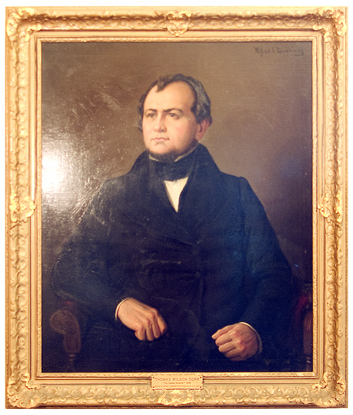Rhode Island Revolution

On April 12, 1861, the newly formed Confederate States of America fired on Fort Sumter in South Carolina, thus beginning the American Civil War. Twenty years earlier, a civil war of another type broke out — but in this case, it was contained entirely within the state of Rhode Island.
From Rhode Island’s inception in 1663, its charter granted the right to vote only to landowners. At the time, this was a common rule, but by the early 1800s, almost all of the states had dropped the land ownership requirement, and granted all free white men the right to vote. (Women and non-whites were still excluded, in almost all cases.) Rhode Island was the exception — there, the change occurred neither easily nor peacefully.
In 1841, a large contingent of Rhode Islanders were working within the system to gain universal suffrage for white men in the state. By October, they had given up on working with the state’s legislature. Lead by a man named Thomas Wilson Dorr, this group held their own “People’s Convention” for the purpose of drafting a new constitution, one which granted the right to vote to any white male who resided in the state for at least a year prior to an election. And then, in the following May, Dorr’s followers elected him Governor.
Unfortunately, the incumbent government had its own election, choosing Samuel Ward King to continue as the state’s governor. King refused to implement Dorr’s constitution and, instead, declared martial law, aiming to prevent insurrection. King requested military support from then-President John Tyler. Tyler declined, believing that violence was an unlikely result and federal troops were therefore unnecessary. He was mostly correct. A few skirmishes broke out, culminating in an attack by Dorr’s followers on the Arsenal in Providence on May 19, 1842. The “Dorrites” were rebuffed, and a follow-up attack, while expected, never materialized. The rebellion was quashed before it picked up any further steam.
Dorr ended up fleeing the state. King, to his credit, installed a liberalized constitution by May of 1843, extending the right to vote to any free man (regardless of race) who either owned land or who could pay a $1 poll tax. Dorr, in hopes that this liberalization also came with forgiveness, returned in October of 1843 — and was charged with (and convicted of) treason. He would serve 12 months of what was to be a life sentence before being released.
Today, the Secretary of State of Rhode Island officially lists both Dorr and King as governors of Rhode Island — the final two under the state constitution Dorr and his followers rebelled against.
Bonus fact: The first state to grant women full suffrage? Wyoming, in 1890 — twenty years after the Fifteenth Amendment prohibited U.S. governments from denying the right to vote due to race.
From the Archives: Walker’s Filibuster: Another strange American revolution. Kind of.
Related: “The Dorr War: Treason, Rebellion and the Fight for Reform in Rhode Island,” by Rory Raven. Two five-star reviews.

Leave a comment